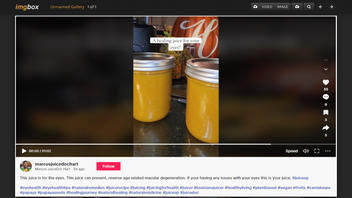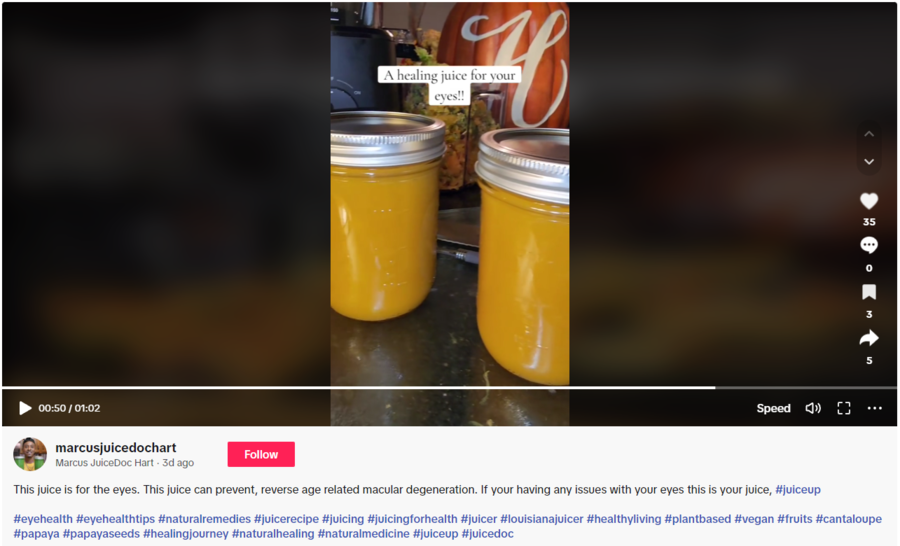STORY UPDATED: check for updates below.

Do cantaloupe and papaya juices help prevent or reverse age-related macular degeneration, or AMD? No, that's not true: According to an ophthalmologist at the National Eye Institute, there is no scientific evidence to support the claim that cantaloupe and papaya juice specifically help prevent or reverse AMD. The complex eye condition and its progression are influenced by various factors, including genetics, age, and lifestyle.
The claim appeared in a video (archived here) published on TikTok by Marcus JuiceDoc Hart on November 24, 2023, under the title "A healing juice for your eyes!!" The post's caption said:
This juice is for the eyes. This juice can prevent, reverse age related macular degeneration. If your having any issues with your eyes this is your juice, #juiceup
#eyehealth #eyehealthtips #naturalremedies #juicerecipe #juicing #juicingforhealth #juicer #louisianajuicer #healthyliving #plantbased #vegan #fruits #cantaloupe #papaya #papayaseeds #healingjourney #naturalhealing #naturalmedicine #juiceup #juicedoc
This is what the post looked like on TikTok at the time of writing:
(Source: TikTok screenshot taken on Mon Nov 27 15:59:25 2023 UTC)
The video
The 62-second clip provides a simple juice recipe along with the claim of being essentially a fix-all for your eyes. Here's what the narrator said:
Happy Thanksgiving, family.
Listen, we have a recipe of one cantaloupe and one papaya. And this recipe is very powerful to help you to restore your eyes.
So, it has two powerful antioxidants called lutein and zeaxanthin, and they are a part of the carotenoid family which produce pigments from plants to give their fruits and vegetables its yellow and reddish color.
So, if you're dealing with age-related macular degeneration, cataracts, vision loss, anything dealing with the eyes, this is your juice. It can restore those issues. It can prevent those issues.
So, listen, juice up on this here. Juice up on these cantaloupes. Juice up on these papayas and bless those eyes, right? Because if you do this, your eyes gonna love you.
National Eye Institute
Dr. Emily Chew, director of the Division of Epidemiology and Clinical Applications at the National Eye Institute (NEI), told Lead Stories in a November 27, 2023, email that while eating healthy is a good idea, it isn't a magic bullet. She said:
Following a diet rich in fruits and vegetables, lean protein, especially fish, and whole grains, is essential to maintaining good health, including that of your eyes.
There is no scientific evidence that specific food combinations or dietary supplements can improve eye-sight or cure any degenerative diseases of the eye.
Before taking any dietary supplements, you should consult with your doctor. Some dietary supplements can cause adverse effects and interact with medications you are already taking.
Dr. Steven Yeh, a professor of ophthalmology and director of retinal disease and uveitis at the Stanley M. Truhlsen Eye Institute at the University of Nebraska Medical Center, said in a November 28, 2023, email that there's no harm in eating the two fruits mentioned in the social media video. He said:
Cantaloupe and papaya contain lutein and zeaxanthin ... but the nutritional content may vary. While they may have other health benefits, they do not prevent or reverse age-related macular degeneration.
Age-related eye disease study
Additionally, an article published on the National Institutes of Health website titled "How to Feast for Your Eyes" (archived here), about an age-related eye disease study conducted by Chew and her collaborators, examines the impact of diet on eye health.
Overall, the study showed a supplement containing antioxidants in the form of vitamins C and E along with minerals like zinc and copper lowered the risk of developing advanced AMD by 25 percent. As Chew said in her email response, there is no mention of a cure or improvement, only a slowing of the progression of the retinal disease. In particular, the study demonstrated that lutein and zeaxanthin were "somewhat effective" at lowering the risk of developing advanced AMD,
The NEI website lists the following four ways to reduce AMD risk:
- Quit smoking -- or don't start
- Engage in regular physical activity
- Maintain healthy blood pressure and cholesterol levels
- Consume healthy foods, including leafy green vegetables and fish
The NEI website includes the following information on treatments for AMD:
Treatment for AMD depends on the stage and type. There's currently no treatment for early AMD, so your eye doctor will probably just keep track of how your eyes are doing with regular eye exams. Eating healthy, getting regular exercise, and quitting smoking can also help.
If you have intermediate AMD in 1 or both eyes, special dietary supplements (vitamins and minerals) may be able to stop it from turning into late AMD. If you have late AMD in only 1 eye, these supplements may slow down AMD in your other eye.
Learn more about supplements for AMD
If you have wet AMD, there are other treatments that may be able to stop further vision loss:
- Medicines called anti-VEGF drugs that the doctor injects in your eye
- Photodynamic therapy (PDT), a combination of injections and laser treatment
Learn more about treatments for wet AMD
There's currently no treatment for late dry AMD -- but researchers are hard at work looking for treatment options. And you can get support to help you live with vision loss from AMD.
Updates:
-
2023-11-28T16:11:25Z 2023-11-28T16:11:25Z Adds comments and context from Dr. Steven Yeh


















